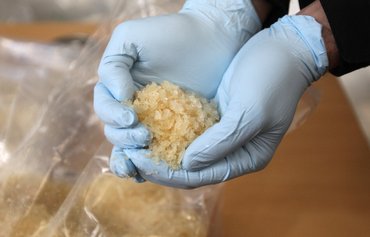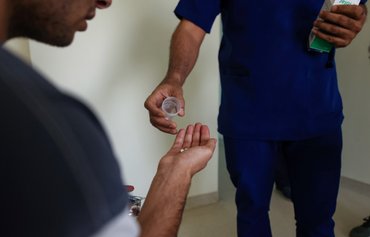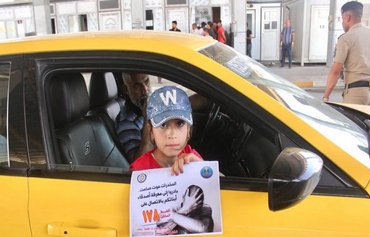MUSCAT -- Oman on Thursday (June 22) announced the breakup of a drug smuggling network and the seizure of more than six million Captagon pills during a Royal Oman Police (ROP) bust aided by Saudi Arabia.
"In co-operation with Saudi authorities", police tracked and ambushed an "international network that was smuggling large quantities of drugs and psychotropic substances", the official Oman News Agency said.
The network had been smuggling drugs across land and sea borders, it said.
"Six million Captagon pills were seized during the operation," according to the news agency, which said the drugs were stored in various hideouts and were intended for exporting.
![Saudi Directorate of Narcotics Control officers on March 1, 2022, sort through Captagon tablets seized during a special operation raid in Jeddah. [Fayez Nureldine/AFP]](/cnmi_am/images/2023/06/23/42708-Jeddah-drug-bust-600_384.jpg)
Saudi Directorate of Narcotics Control officers on March 1, 2022, sort through Captagon tablets seized during a special operation raid in Jeddah. [Fayez Nureldine/AFP]
![Sacks of confiscated Captagon pills are seen here last July 27 at the judicial police headquarters in the Lebanese town of Kafarshima south of Beirut. [Joseph Eid/AFP]](/cnmi_am/images/2023/06/23/42707-Captagon-pills-lebanon-600_384.jpg)
Sacks of confiscated Captagon pills are seen here last July 27 at the judicial police headquarters in the Lebanese town of Kafarshima south of Beirut. [Joseph Eid/AFP]
"The smugglers' camouflage was smart, but smarter monitoring by the ROP's Directorate General for Combating Narcotic Drugs and Psychotropic Substances and Saudi authorities concerned botched the heist," the agency said.
The quantity confiscated is significant for Oman, which usually announces much smaller hauls, though international maritime forces regularly seize massive quantities of illegal drugs, including heroin, from vessels in the Gulf of Oman.
A video released by the police on social media showed officers unloading plastic bags packed with Captagon tablets from white cardboard boxes and round plastic containers.
Omani authorities did not specify the intended destination of the drug shipment, but neighbouring Saudi Arabia is considered the largest market for the addictive amphetamine.
The vast majority of the region's Captagon, which derives its name from a once legal drug for combating narcolepsy, is produced in Syria and Lebanon and smuggled to its main consumer market in the Gulf.
Syria has become a global leader in the production of Captagon, much of which is trafficked through Lebanon via the Syrian regime's allies, Hizbullah.
Syrian President Bashar al-Assad's inner circle is deeply embroiled in the illicit trade and enables, facilitates and reaps enormous profits from manufacturing and trafficking Captagon and other illegal drugs throughout the region.
Kingdom's war on drugs
Saudi Arabia has hit back after becoming a major Captagon market, ending a moratorium on the death penalty for drug cases and launching a widespread crackdown that has seen a sharp uptick in arrests.
The kingdom regularly announces seizures of amphetamine pills without specifying whether they are Captagon or other narcotics.
A 37-year-old Saudi drug dealer who gave his name as simply Ibrahim said he has been forced to operate with more caution as the kingdom intensifies its war on drugs, cracking down on an influx of Captagon from Syria and Lebanon.
Several of Ibrahim's customers have been arrested in recent weeks, he told AFP from the Red Sea port of Jeddah, where a number of massive shipments of illegal drugs have been seized as they entered the kingdom.
At least two Saudi security officers have been killed in drug raids recently, including one last week, according to state media.
"Several of my customers were recently arrested in a private compound," said Ibrahim, who mainly sells Captagon and hashish. "This never used to happen before."
Acts of violence committed by drug users prompted the crackdown, a security official said.
They include a recent case in which a drug addict killed his parents by dousing them with fuel and setting them on fire, said the official, who spoke on condition of anonymity because he is not authorised to speak to the press.
Targeting dealers and users
Across Jeddah, roadside billboards urge citizens to report any illicit drug activities to the authorities.
While previous anti-drug campaigns targeted smuggled shipments, the latest initiative is zeroing in on dealers and users within the country.
"In the last year to two years, we have seen an uptick in internal arrests and the use of the death penalty (in drug cases)," said Caroline Rose of the New Lines Institute think tank.
The shift from border seizures to arrests of dealers is partly due to "a focus on security issues surrounding Captagon and a recognition of just how deep some of these networks go", Rose said.
The campaign is also aimed at keeping drugs out of the hands of Saudi youth, in a country where 51% of the 32.2 million inhabitants are under the age of 30.
"Saudi Arabia is carrying out a huge economic project...and the youth are the main pillar of this project," said Saudi political analyst Sulaiman al-Oqaily.
Addiction on the rise
Rampant drug use is taking its toll, with more than 200,000 addicts in Saudi Arabia, according to health ministry figures cited by domestic media.
Growing numbers are seeking addiction treatment, mainly because they fear arrest, said Hamad al-Sheehan of the Rushd Specialised Centre for Family Counselling in Riyadh.
"After the recent campaign, the numbers have increased at the centre," the director of treatment said from his office, where at least 10 young men were waiting to be seen.
"We currently receive 1,000 people per month instead of only 100 previously."
He said that Captagon and other methamphetamine-type drugs are among the most abused in the kingdom. Most of his patients are between 17 and 21 years old and half are women, he said.
If al-Sheehan's patients fear arrest, the crackdown is working, al-Oqaily said.
"The message is if you don't fear for yourself, you should fear the government," he said.
Last month, Interior Minister Prince Abdulaziz bin Saud bin Nayef warned drug dealers and smugglers that they will not escape.
"We are still at the beginning of the campaign," he said.

![A security guard places information banners at the Rushd Specialised Centre for Family Counselling in Riyadh on June 15. The private clinic treats patients for drug addiction. [Fayez Nureldine/AFP]](/cnmi_am/images/2023/06/23/42706-Rushd-Specialised-Centre-600_384.jpg)






